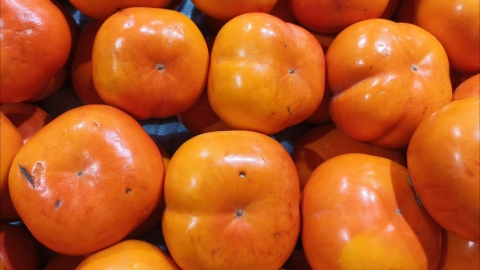What should not be eaten with persimmons?
Generally speaking, persimmons are a nutrient-rich fruit, but they may cause adverse reactions when consumed with certain foods and medications. Foods to avoid include crabs, goose meat, sweet potatoes, eggs, and milk. Medications to avoid include calcium gluconate tablets, amoxicillin capsules, sodium bicarbonate tablets, aspirin effervescent tablets, and ferrous sulfate tablets. Detailed explanations are as follows:

1. Foods
1. Crabs
Both persimmons and crabs are cold-natured foods. Consuming them together increases the cold nature, irritating the gastrointestinal tract and potentially causing symptoms such as abdominal pain and diarrhea. Additionally, the tannic acid in persimmons reacts with the protein in crabs to form tannic protein, which is difficult to digest and may lead to the formation of persimmon bezoars in the stomach.
2. Goose Meat
Goose meat contains high-quality protein, and the iron in this protein can react with tannic acid in persimmons, forming complexes that are difficult to digest and absorb. This may reduce nutritional value and potentially cause digestive symptoms such as abdominal pain, vomiting, and diarrhea.
3. Sweet Potatoes
Sweet potatoes contain large amounts of starch, which can stimulate excessive secretion of gastric acid after consumption. Meanwhile, the tannic acid and pectin in persimmons may combine with gastric acid to form persimmon stones, impairing gastrointestinal digestion and emptying functions and potentially causing intestinal obstruction.
4. Eggs
When consumed together, the tannic acid in persimmons combines with the protein in eggs to form tannic protein, which affects protein digestion and absorption and may cause symptoms such as abdominal pain, vomiting, and diarrhea.
5. Milk
Milk contains large amounts of protein, which can form precipitates when it encounters tannic acid in persimmons, affecting protein digestion and absorption and potentially causing symptoms such as abdominal pain and diarrhea. Additionally, the calcium in milk may also combine with tannic acid in persimmons, forming complexes that are difficult to digest and absorb.
2. Medications
1. Calcium Gluconate Tablets
Persimmons are rich in tannic acid. When taken with calcium supplements such as calcium gluconate tablets, tannic acid can combine with calcium to form compounds that are difficult for the body to absorb. This not only reduces calcium absorption efficiency but may also lead to stone formation in the body, posing a threat to health.
2. Amoxicillin Capsules
Some components in persimmons can stimulate gastric acid secretion. When taken with antibiotic medications such as amoxicillin capsules, this may affect drug absorption and efficacy. In cases of excessive gastric acid secretion, the absorption rate of antibiotics may decrease, affecting their antibacterial effects.
3. Sodium Bicarbonate Tablets
Sodium bicarbonate tablets are primarily used to regulate acid-base balance in the body and relieve symptoms of excessive gastric acid. However, tannic acid in persimmons may react with sodium bicarbonate, affecting the medication's effectiveness. Additionally, persimmons themselves may stimulate gastric acid secretion, counteracting the intended therapeutic effects of sodium bicarbonate.
4. Aspirin Effervescent Tablets
Aspirin effervescent tablets contain components such as salicylic acid, and tannic acid in persimmons may chemically react with salicylic acid, forming substances that are difficult to dissolve. This not only reduces the efficacy of aspirin but may also irritate the gastric mucosa, causing discomfort.
5. Ferrous Sulfate Tablets
Ferrous sulfate tablets are commonly used as iron supplements. Tannic acid in persimmons can combine with iron ions to form compounds that are difficult to absorb. This not only reduces the effectiveness of iron supplementation but may also affect drug absorption and utilization.
To avoid adverse reactions and reduced efficacy, it is recommended to avoid consuming persimmons simultaneously with the aforementioned foods and medications.





